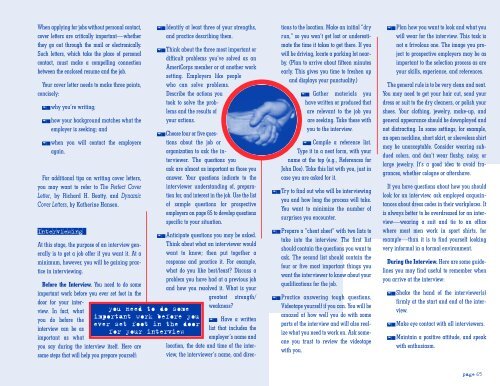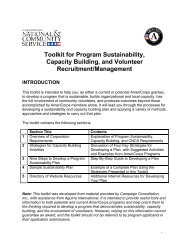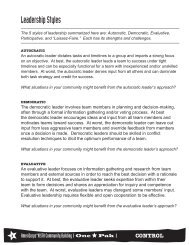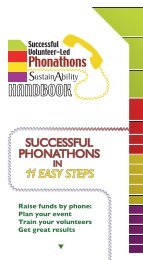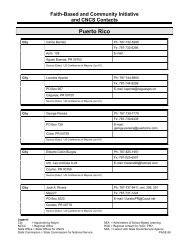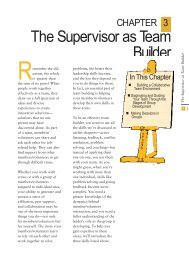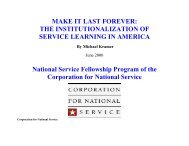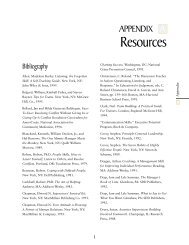Next Steps: Life After Americorps - National Service Knowledge ...
Next Steps: Life After Americorps - National Service Knowledge ...
Next Steps: Life After Americorps - National Service Knowledge ...
You also want an ePaper? Increase the reach of your titles
YUMPU automatically turns print PDFs into web optimized ePapers that Google loves.
When applying for jobs without personal contact,<br />
cover letters are critically important—whether<br />
they go out through the mail or electronically.<br />
Such letters, which take the place of personal<br />
contact, must make a compelling connection<br />
between the enclosed resume and the job.<br />
Your cover letter needs to make three points,<br />
concisely:<br />
* why you’re writing;<br />
* how your background matches what the<br />
employer is seeking; and<br />
* when you will contact the employere<br />
again.<br />
For additional tips on writing cover letters,<br />
you may want to refer to The Perfect Cover<br />
Letter, by Richard H. Beatty, and Dynamic<br />
Cover Letters, by Katherine Hansen.<br />
Interviewing<br />
At this stage, the purpose of an interview generally<br />
is to get a job offer if you want it. At a<br />
minimum, however, you will be gaining practice<br />
in interviewing.<br />
Before the Interview. You need to do some<br />
important work before you ever set foot in the<br />
door for your interview.<br />
In fact, what<br />
you do before the<br />
interview can be as<br />
important as what<br />
you say during the interview itself. Here are<br />
some steps that will help you prepare yourself:<br />
you need to do some<br />
important work before you<br />
ever set foot in the door<br />
for your interview<br />
* Identify at least three of your strengths,<br />
and practice describing them.<br />
* Think about the three most important or<br />
difficult problems you’ve solved as an<br />
AmeriCorps member or at another work<br />
setting. Employers like people<br />
who can solve problems.<br />
Describe the actions you<br />
took to solve the problems<br />
and the results of<br />
your actions.<br />
* Choose four or five questions<br />
about the job or<br />
organization to ask the interviewer.<br />
The questions you<br />
ask are almost as important as those you<br />
answer. Your questions indicate to the<br />
interviewer understanding of, preparation<br />
for, and interest in the job. Use the list<br />
of sample questions for prospective<br />
employers on page 65 to develop questions<br />
specific to your situation.<br />
* Anticipate questions you may be asked.<br />
Think about what an interviewer would<br />
want to know; then put together a<br />
response and practice it. For example,<br />
what do you like best/least? Discuss a<br />
problem you have had at a previous job<br />
and how you resolved it. What is your<br />
greatest strength/<br />
weakness?<br />
* Have a written<br />
list that includes the<br />
employer’s name and<br />
location, the date and time of the interview,<br />
the interviewer’s name, and direc<br />
tions to the location. Make an initial “dry<br />
run,” so you won’t get lost or underestimate<br />
the time it takes to get there. If you<br />
will be driving, locate a parking lot nearby.<br />
(Plan to arrive about fifteen minutes<br />
early. This gives you time to freshen up<br />
and displays your punctuality.)<br />
* Gather materials you<br />
have written or produced that<br />
are relevant to the job you<br />
are seeking. Take these with<br />
you to the interview.<br />
* Compile a reference list.<br />
Type it in a neat form, with your<br />
name at the top (e.g., References for<br />
John Doe). Take this list with you, just in<br />
case you are asked for it.<br />
* Try to find out who will be interviewing<br />
you and how long the process will take.<br />
You want to minimize the number of<br />
surprises you encounter.<br />
* Prepare a “cheat sheet” with two lists to<br />
take into the interview. The first list<br />
should contain the questions you want to<br />
ask. The second list should contain the<br />
four or five most important things you<br />
want the interviewer to know about your<br />
qualifications for the job.<br />
* Practice answering tough questions.<br />
Videotape yourself if you can. You will be<br />
amazed at how well you do with some<br />
parts of the interview and will also realize<br />
what you need to work on. Ask someone<br />
you trust to review the videotape<br />
with you.<br />
* Plan how you want to look and what you<br />
will wear for the interview. This task is<br />
not a frivolous one. The image you project<br />
to prospective employers may be as<br />
important to the selection process as are<br />
your skills, experience, and references.<br />
The general rule is to be very clean and neat.<br />
You may need to get your hair cut, send your<br />
dress or suit to the dry cleaners, or polish your<br />
shoes. Your clothing, jewelry, make-up, and<br />
general appearance should be downplayed and<br />
not distracting. In some settings, for example,<br />
an open neckline, short skirt, or sleeveless shirt<br />
may be unacceptable. Consider wearing subdued<br />
colors, and don’t wear flashy, noisy, or<br />
large jewelry. It’s a good idea to avoid fragrances,<br />
whether cologne or aftershave.<br />
If you have questions about how you should<br />
look for an interview, ask employed acquaintances<br />
about dress codes in their workplaces. It<br />
is always better to be overdressed for an interview—wearing<br />
a suit and tie to an office<br />
where most men work in sport shirts, for<br />
example—than it is to find yourself looking<br />
very informal in a formal environment.<br />
During the Interview. Here are some guidelines<br />
you may find useful to remember when<br />
you arrive at the interview:<br />
* Shake the hand of the interviewer(s)<br />
firmly at the start and end of the interview.<br />
* Make eye contact with all interviewers.<br />
* Maintain a positive attitude, and speak<br />
with enthusiasm.<br />
page 65


